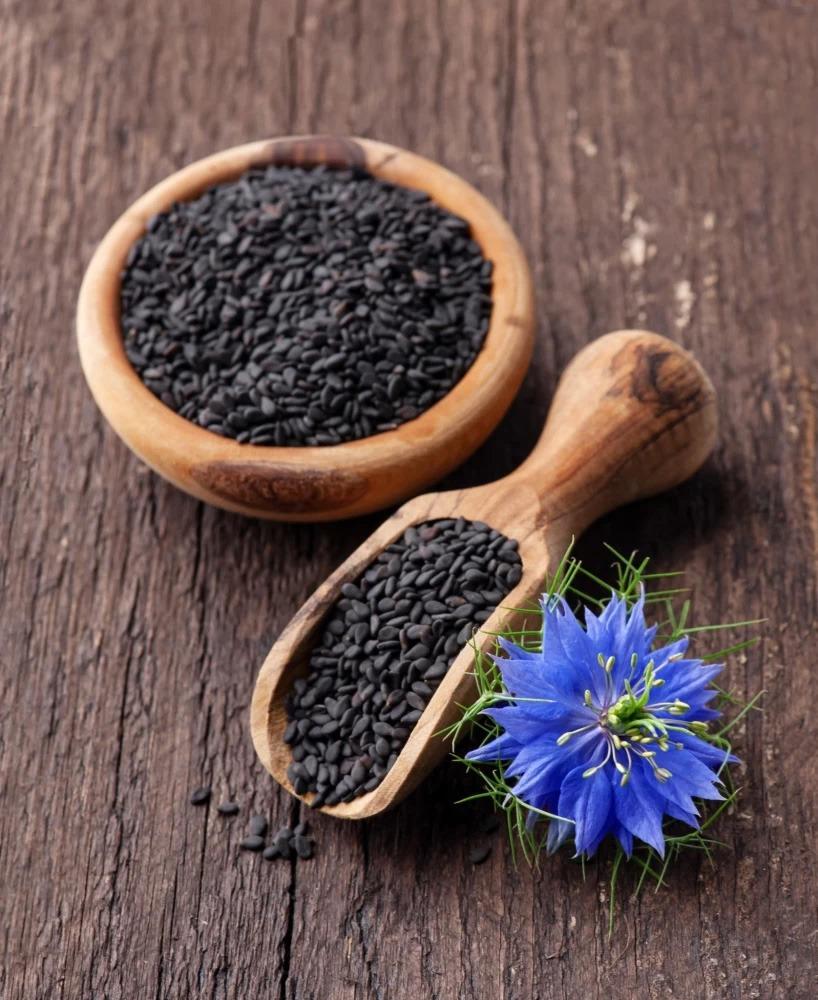Black seed (Nigella sativa)
Black seed is a small black seed, also known as Nigella sativa or black cumin. It has been known in many ancient cultures for its many nutritional and medicinal uses, and people have eaten it in different ways to benefit from its unique properties. Below is a well-organized and detailed article that introduces black seed, and highlights the most important points related to it in simple and easy language.
1. Introduction
Black seed is one of the most popular ingredients in oriental cuisine, as it is believed to have various health benefits. The ancients used it in folk recipes, and some mentioned it in ancient medicine books to treat some health problems. In our modern era, black seed continues to receive wide attention, both from experts and consumers looking for natural options to improve their lifestyle.
2. What is black seed?
- Shape : Very small seeds, black in colour, with a sharp, peppery flavour.
- Habitat : It is grown in different regions around the world, especially in the Middle East and North Africa.
- Name : In some countries it is called “Nigella sativa,” and in other places it is known as black cumin. Its name “Nigella sativa” is associated with the belief of many in its many benefits.
3. Basic Ingredients
- Essential oils
- Black seed contains volatile oils that give it its distinctive smell and help add a strong flavour to foods.
- Active Ingredients
- There is much talk about important compounds such as “thymoquinone,” which is believed to play a role in giving black seed some of its beneficial properties.
- Fatty acids and proteins
- Black seed contains a number of fatty acids and proteins, making it a nutrient-rich ingredient.
4. Potential Benefits
Many people believe that black seed has many health and nutritional benefits. Although experiences vary from one person to another, there are recurring points mentioned by black seed lovers:
- Boost body immunity
- Adding black seed to your daily diet is said to help support immunity, especially when taken regularly.
- Helps fight free radicals
- Some suggest that some of its compounds may help reduce harmful effects on cells, which may protect the body from some health problems.
- improve digestion
- Some believe that its spicy nature helps stimulate digestion and reduce bloating or gas.
- Relieve cold and cough symptoms
- Some people resort to mixing black seed with honey or hot drinks in case of a cold, believing that it contributes to a feeling of comfort.
Note: Response varies from person to person, and not all people may experience the same benefits.
5. Methods of use
There are various ways to enjoy black seed, including adding it to foods or using its oil:
- Add ground or whole to food.
- Black seed can be ground and added to bread and pastries before baking.
- They can be sprinkled whole over salads or stews to enhance the flavour.
- Preparing black seed tea
- Some people boil it with water to make a mild tea, which can be mixed with honey or other herbs.
- Black seed oil
- It is sold in some stores as a ready-to-use oil, and some people may put it in salads or use it as a nutritional supplement in a small quantity.
- It can also be applied topically to the skin, but it is best to dilute it or apply a small amount to test for any sensitivity.
- Dietary supplement capsules
- Black seed may be found in pill (capsule) form in health food stores, and some people choose it in search of a higher concentration of beneficial compounds.
6. Precautions and Tips
Although black seed is considered a natural ingredient, there are some things to consider:
- Gradual intake
- Many specialists recommend gradual consumption of black seed, especially when adding it to food daily, to ensure that no allergies or digestive disorders occur.
- Drug interactions
- If you are taking certain medications, especially blood pressure or diabetes medications, consult your doctor before taking large amounts of black seed, as it may affect the effectiveness of the medications.
- The right dose
- There is no conclusive scientific agreement on the specific amount, but it is generally preferable not to overdo daily consumption to avoid any adverse effects.
- Allergy
- Black seed, or specifically black seed oil, can cause irritation when applied directly to the skin, so try a small amount at first.
7. Conclusion
Black seed has a long history of use in many countries, both for its taste and for health purposes. While many people’s personal experiences point to various benefits and advantages, it is important to remember that scientific research on these seeds is still ongoing, and that responses vary depending on the nature of the body and its needs. If you are thinking of adding black seed to your diet, you can start with small amounts in different meals, or consult a nutritionist to find out what is best for you.
Black seed adds a distinctive flavour to food, and reflects a popular heritage rich in values and traditions. Try adding it to some dishes or use the oil extracted from it to enjoy a unique taste, while being careful to use it in moderation, because balance is the basis for everything related to food and health.


